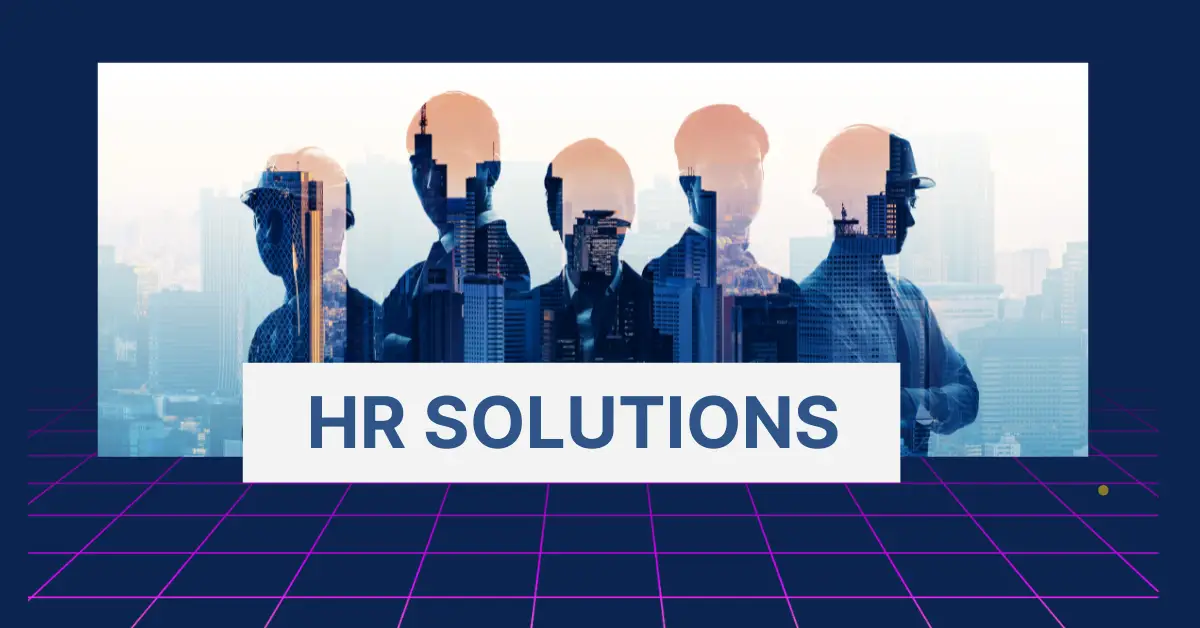Innovative HR Solutions for Modern Workplaces
In the dynamic world of business, human resources (HR) plays a pivotal role. It’s not just about hiring and firing anymore. Modern HR is about fostering a positive work culture, attracting top talent, and driving employee engagement. It’s about shaping the future of work.
Enter HR solutions. These innovative tools and strategies are transforming the HR landscape. They’re making HR processes more efficient, more effective, and more aligned with business goals. From HR consulting to talent acquisition, from employee engagement to payroll solutions, HR solutions are the game-changers. They’re the tools that HR professionals need to navigate the complexities of the modern workplace.
Understanding HR Solutions and Their Impact on Modern Workplaces
HR solutions encompass a wide range of tools, technologies, and strategies designed to enhance the efficiency of HR departments. They are transforming how businesses manage employees and processes.
Traditionally, HR tasks were manual and time-consuming. These included hiring processes, payroll administration, and performance evaluations. Today, technology streamlines these tasks, allowing HR professionals to focus more on strategic initiatives.
Modern HR solutions offer various functionalities, including recruitment tools, employee engagement platforms, and performance management systems. These innovations are integral to effective HR management.
Key benefits of HR solutions in the workplace include:
- Improved efficiency in managing HR processes.
- Enhanced data collection and analysis capabilities.
- Better employee experiences and satisfaction.
HR solutions are not one-size-fits-all. They’re customizable to fit the unique needs of different organizations. Companies can select specific modules or features that address their immediate requirements. Moreover, integrating HR solutions with existing business systems provides seamless operations across departments, ensures data accuracy, reduces redundancy, and fosters better communication.
Overall, these solutions significantly influence modern workplaces. They help drive growth, increase employee satisfaction, and ensure a competitive edge in the market.
The Evolution of HR Solutions
The evolution of HR solutions has been phenomenal. What started as basic clerical support has become a critical driver of business success. In the past, HR roles were reactive—responding to issues as they arose. Today, HR is a strategic partner in business, anticipating needs and proactively developing solutions.
The shift began with the introduction of automation in payroll and record-keeping. Then came integrated HR software, bringing together multiple HR processes under one platform. The digital age has brought advancements like cloud-based systems and mobile applications. These tools allow HR activities to be conducted anywhere, anytime, and on any device, enhancing flexibility.
Artificial intelligence and machine learning are now revolutionizing recruitment and performance analytics. These technologies predict trends and deliver personalized employee experiences. As these technologies continue to evolve, HR solutions will undoubtedly reach new levels of sophistication, driving further innovation in the workplace.
The Role of HR Consulting in Shaping Workplace Strategies
HR consulting is vital for organizations seeking efficient and effective HR strategies. Consultants bring expert knowledge that helps craft tailored solutions. Companies often need external guidance to navigate complex HR challenges. HR consultants assess current practices and suggest improvements that align with industry standards and business objectives.
They support strategic decision-making by providing data-driven insights. This helps align HR strategies with long-term organizational goals, ensuring a coherent approach. Moreover, HR consultants assist in implementing technology solutions. They identify suitable software and facilitate a smooth transition, minimizing disruptions and enhancing user adoption. Consultants also provide training to internal teams, equipping staff with the knowledge and skills needed to manage new systems effectively.
Ultimately, HR consulting shapes workplace strategies by fostering change and driving innovation. It empowers organizations to adapt to modern demands and thrive in an ever-changing business environment.
Talent Acquisition in the Digital Age
Talent acquisition has undergone a transformation in today’s digital era. Technology plays a pivotal role in finding the right candidates quickly and effectively. Recruiters now leverage technology to streamline the hiring process. Online platforms and databases have replaced traditional headhunting methods, enhancing reach and efficiency.
Organizations use sophisticated recruitment tools to assess candidates. These tools screen resumes, conduct assessments, and even schedule interviews. The result is faster, more accurate hiring.
Key benefits of digital talent acquisition include:
Enhanced candidate reach and engagement.
Reduction in time-to-hire.
Improved quality of hire through data-driven assessments.
Social media has become a powerful tool for recruitment. It enables businesses to connect with passive candidates who may not actively be seeking jobs but are open to opportunities. Moreover, data analytics offers insights into hiring trends and candidate preferences. This information helps in crafting more effective recruitment strategies tailored to meet specific needs.
Adapting to these changes is crucial. Companies must integrate digital tools into their talent acquisition strategies to remain competitive and attract top talent.
Innovative Recruitment Tools and Techniques
The rise of digital recruitment tools has ushered in innovative hiring methods. These advancements have significantly altered traditional recruitment practices. Applicant Tracking Systems (ATS) help manage job applications efficiently. They organize resumes and track candidate progress through the hiring pipeline, simplifying recruiters’ tasks.
Video interviewing platforms have gained popularity. They allow recruiters to connect with candidates globally, offering flexibility and reducing travel costs. Psychometric testing tools measure candidates’ cognitive abilities and personality traits. These assessments aid in selecting individuals who align with company culture.
Automation plays a key role in recruitment. Chatbots engage candidates, answer questions, and collect initial details, freeing recruiters to focus on complex tasks. Moreover, AI-powered platforms predict candidate success rates by analyzing historical data. These insights help make informed hiring decisions, reducing biases and improving outcomes.
Incorporating these tools makes recruitment more effective, ensuring the right candidates are matched to the right roles with greater precision.
Enhancing Employee Engagement for Better Productivity
Employee engagement is crucial for driving productivity. Engaged employees invest more in their work and contribute positively to organizational success. Enhancing engagement starts with understanding employee needs. Organizations should prioritize open communication and feedback loops to address these needs.
Implementing engagement strategies can create a positive work environment. Recognizing achievements boosts morale and motivation, leading to better performance. Engagement can be improved through:
Personalized career development plans.
Regular recognition of contributions.
Opportunities for team-building activities.
HR tools help gauge engagement levels accurately. Surveys and feedback platforms provide insights into employee satisfaction and areas for improvement. Moreover, remote work solutions have become necessary. They ensure engagement by facilitating communication and collaboration among dispersed teams.
Ultimately, a well-engaged workforce is more productive. Focusing on engagement strategies leads to better results and a stronger company culture.
Embracing innovative HR solutions is essential in today’s fast-paced business world. These tools offer more than efficiency—they enable strategic growth. Modern HR technologies transform employee management. They enhance engagement, nurture talent, and streamline complex processes seamlessly.
Organizations that harness these innovations are better equipped to face future challenges. They build resilient, agile workforces prepared for change. The journey toward transformation involves thoughtful selection and integration of HR solutions. Businesses must align these tools with their core objectives.
A commitment to continuous improvement and adaptation is key. Regular assessments ensure that HR strategies remain effective and beneficial. Ultimately, investing in the right HR solutions is an investment in a company’s future. It lays the groundwork for sustained organizational success.



